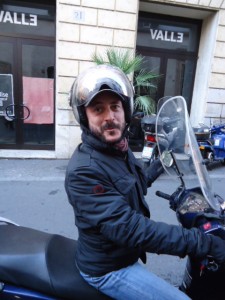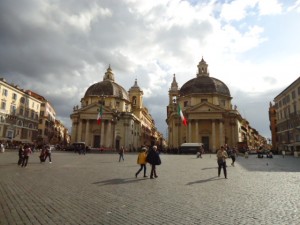I met Andrea Baranes at the Teatro Valle in Rome:
he is closely associated with the group that has occupied the theatre for the last five months (see my post of Nov 14). Andrea is an economist by training and his speciality is ‘ethical finance’.
We spoke on November 10, three days before Prime Minister Silvio Berlusconi’s resignation. Earlier in the week the government had been forced to accept record interest rates in order to borrow money from the financial markets; Italy’s financial crisis was deepening day by day.
‘Do you think it’s true,’ I said to Andrea (who speaks fluent English), ‘that Italy has been living wildly beyond its means?’
Andrea shook his head. ‘It is true,’ he said, ‘that there are great imbalances within Europe. But I wouldn’t say that Italy went beyond its means. Twenty years ago Italy’s debt was evern larger than it is now. Why did no one talk of bankruptcy then? Why is it being talked of now? It is only because the chances of speculating against individual states are much greater now than they were then. Look at Goldman, Sachs. They were selling debt to Greece and at the same time they were betting against Greek debt. Of course there are structural problems in Italy, but twenty years ago we were in the same situation, except that the speculative climate did not exist.’
‘Do you think Italy should do what Malaysia did and impose strict controls on the flow of capital?’
‘That isn’t possible for Italy,’ said Andrea, ‘because of the Euro. The better option is something that was suggested recently: that Italians should use their savings to buy Italian bonds. If Italian debt was held in Italy the interest rates could be brought down to 3%. Italian families have huge savings and Italy has a huge debt – if the two could be matched that would be an easy way out. This is what happens in Japan. The Japanese also have a huge debt but they are safe because their debt is held internally. But the problem is that in Italy people don’t have the sense of being part of the state – they miss the feeling that the state is theirs and so is the debt. And this will not happen until there is an audit of the public debt. People must know what all this borrowed money was spent on.’
‘I was just told,’ I said to Andrea. ‘That one of your ministers recently referred to young Italians as bamboccioni – spoilt children. Do you think there may be some truth to this? Certainly if you look at Italy from an Indian or even American perspective, it does seem that the level of welfare is very high. So many things are free in Italy – schools, health-care, universities. Is it possible that Italians want to eat their ice-cream and have it too?’
Andrea shook his ice-cream cone. ‘It is true that all Europeans are very privileged,’ he said, ‘but it’s not true that the public debt is a result of welfare spending. The reason public debt is so high, and growing so fast, is because of the interest payments. The money is all going into debt servicing now – not welfare. That is why we need an audit of the public debt. We need to know what that money was being used for. Corruption? Or welfare?’
‘Do you think the European Union will survive this crisis?’ I asked finally. ‘Could the Eurozone split into two halves – a northern Europe and a southern Europe?’
‘The European Union and the single currency are different projects,’ said Andrea. ‘The two should not be conflated. There is no European system of taxation or welfare. A company can escape taxes in Italy by going to Ireland or Holland. This is the original sin. Europe was built to create free capital, free markets and a single currency. There was no provision for social and political projects. It is like trying to walk on one leg.’
Later that day it was confirmed that Silvio Berlusconi would resign in favour of Mario Monti, an economist who has never held political office. The news was greeted with cheers by financial analysts around the world – but in Italy some informed people were sceptical. The well-known journalist Marco d’Eramo for example:
although unreservedly glad to see Berlusconi gone, Marco has reservations about his replacement. Monti, like the new Prime Minister of Greece, Lucas Papademos, is a financial technocrat with a history of enforcing budget-cutting measures: he can even be seen as an advocate of right-wing economic orthodoxy.
Where will these two technocrats lead Greece and Italy? No one knows.
I was struck by a curious paradox. For years pundits have been predicting that free markets will force the technocrats who govern China to adapt to Western models of democracy. But it could be said that the opposite has actually happened. Free markets have forced two major European countries – Greece and Italy – to move towards a technocratic form of governance.
What is to be made of this?
Giorgio Forti, an eighty-year-old scientist, had something interesting to say. Giorgio was in the Resistance as a teenager and he was for decades the dean of the Biology department in the University of Milan. He is a member of the Italian Academy of Sciences (Accademia dei Lincei, which was founded in 1603; Galileo Galilei was one of its first members).
‘It has become clear now,’ said Giorgio, ‘that free-market capitalism is incompatible with democracy.’




